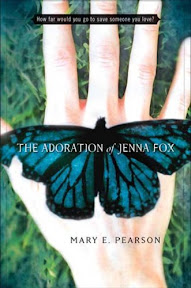 Reviewed by Steven Wolk.
Reviewed by Steven Wolk.As children get older there comes a point when we start to hear the phrases "boy book" and "girl book." Sadly, this reading gender label is occurring younger and younger. It’s not uncommon to hear eight year-old boys shunning a book because it's a "girl book." So, it thrills me when a young adult novel comes along with a female protagonist that will equally appeal to boys. I have zero doubt that if a boy were to begin The Adoration of Jenna Fox they would get sucked into it like a black hole.
From the first few pages there is a deeply unsettling tenor to this story. Two weeks prior Jenna Fox had awakened from a yearlong coma. There was an accident. Two of her friends may have been involved. She used to live in Boston but now lives in California. Her father still works in Boston. Her grandmother, Lily, lives with them but Jenna can sense she does not like her own granddaughter. Her relationship with her mother is perfectly Arctic. And Jenna remembers none of these people; or the accident, or Boston, or toddler words such as apple or jump. Jenna’s life is a torment.
In a sense, science is a character in this book, and more specifically medical science and the moral questions of how far science – and people – should go to keep someone alive. And what even constitutes a someone. A brain? A body? A soul? Bits of DNA? A trillion synapses firing in your head?
Jenna Fox is a mystery, a futuristic medical thriller, a family drama, and a deeply philosophical tale of who we are and the boundaries of science, all tightly wrapped into a story chock-full of lush words and splendid images and captivating characters. Early on Jenna meets her neighbor, Mr. Bender, an environmental artist. He explains: "I create art from found objects in nature." Isn't that fantastic? How many environmental artists do you meet in life?
If there is one element in the book that gave me pause it would be the ending. Is it possible that the author just pulled a thematic rug out from under me? As I read this book my mind absolutely boiled with the possibilities for teachers to use this story to have kids explore the ethical dimensions of science, how people (and government) choose to use (and limit) science, and who and what makes us. But the ending opens up an entirely different debate. What, exactly, is this grand story really about? Maybe, just maybe, it's more about what we would do for someone we love and our own survival. And that, for all of you boys out there, does not make this a good book for girls – it makes it a great book for human beings.

3 comments :
Wow, great review!!! I absolutely loved this book too. Definitely a book that could spark great discussion in classes.
I love this book, and I'm pleased that you blurred the gender lines and recommended it across the board. I definitely agree that this book can be used to open up so many discussions related to life, literature, identity, and science.
What a fascinating review. I'm going to look this book up right away!
Thanks!
I'm always interested in what girl protagonists might appeal to boys!
Post a Comment